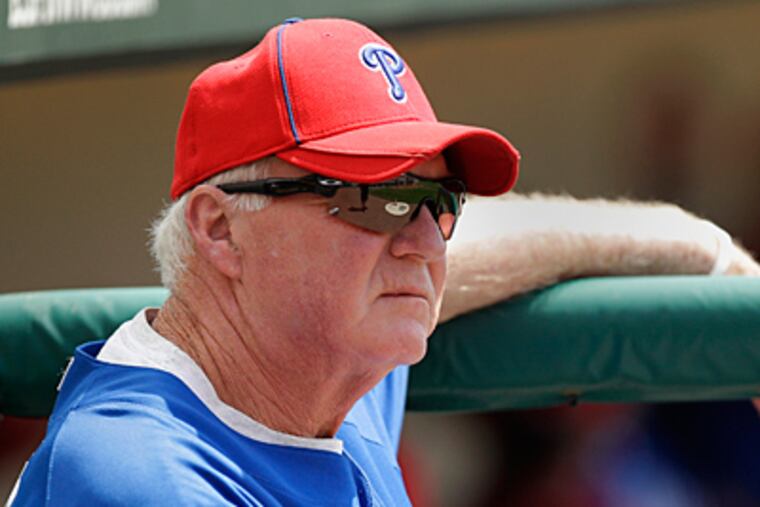Phil Sheridan: Fans are behind the Phillies' success
CLEARWATER, Fla. - The real secret to the Phillies' transformation into a winning organization was in plain view last Sunday at Bright House Field.

CLEARWATER, Fla. - The real secret to the Phillies' transformation into a winning organization was in plain view last Sunday at Bright House Field.
It was raining two hours before the scheduled first pitch of a game against the Baltimore Orioles. It rained for the next three hours, somewhere between a steady downpour and biblical torrents. The whole time, a steady stream of fans waited in line just to get into Diamond Outfitters, the park's retail store.
This wasn't just folks dealing with the water-boredom of a two-hour rain delay. This was a phenomenon. Hundreds of people, most of them already wearing Phillies caps and sweatshirts and jackets, stood in the rain, waiting for a chance to purchase more Phillies stuff.
And there they were, the real reason the Phillies now belong in any conversation about perennial World Series contenders: the fans.
You. Well, you and three million of your closest red-clad friends. There is a symbiotic relationship at work here. As the team moved into Citizens Bank Park and became more successful on the field, fans overflowed the Phillies' coffers - giving the organization the chance to operate like a true big-market baseball team.
But lots of teams have gotten new ballparks without converting that into success: Pittsburgh, Cincinnati, Washington, Baltimore. Other teams have won pennants and World Series without a prolonged surge in attendance: Florida, the Chicago White Sox, Tampa Bay, Colorado.
No, there is no getting around that the Phillies revived the smoldering passion for baseball in Philadelphia and have done a good job of harnessing that energy. This is about the point where some people - pandering talk-radio hosts, lazy columnists and the like - loudly proclaim that the Phillies have flipped the city from a football town to a baseball mecca.
That whole concept is hugely insulting, and not just to the Eagles, who remain insanely popular. It belittles the Philadelphia sports fan to assume that he or she can manage interest in only one sport at a time. Philadelphia is a great sports town, period, and it was long past time the Phillies became a baseball franchise worthy of the market.
They did. This is, without doubt, the best time in their 127-year history to be a Phillies fan. It is sad testament to the sorry nature of that history that just one other era merits consideration. The Phillies of the late 1970s and early 1980s featured some Hall of Famers, won a World Series, and appeared in another. That was a very good time. The mere fact that this team plays in a ballpark instead of the artificial-everything Veterans Stadium tips the scales toward the current era.
But the success and popularity come with some new challenges. It is one thing to surprise and delight fans with an up-and-coming team. It is quite another to meet ever-higher expectations and ever-lower tolerance levels.
No one knows this better than the Eagles, whose every action and utterance bring fresh outrage from an increasingly cranky segment of fans and the aforementioned pandering media.
The easy comeback - the Phillies have a title, the Eagles don't, and that changes everything - simply doesn't hold up. Witness the contempt a number of fans and media already display toward Brad Lidge and Jamie Moyer. They were absolutely essential to the 2008 title. One bad season and they're expendable.
The first real sign of this new Phillies dynamic was the caterwaul when the team traded Cliff Lee. It was admittedly a stunning development. But it wasn't like the days when the Phillies were forced to part with the likes of Curt Schilling and Scott Rolen. They did, after all, acquire Roy Halladay at the same time.
Just like that, GM Ruben Amaro Jr. went from being the bold man of action who added Raul Ibanez and Lee to the defending champions to the fool who gave away the 2010 championship.
It was intriguing that Amaro's explanation, that he was addressing the franchise's long-term ability to contend, was very close to the Eagles' oft-criticized philosophy. The best way to win a title is to have a chance to be in the postseason every year. That requires a mix of long-term planning and quick-strike capability.
Adding Halladay and a couple of very good prospects to the best team in the National League doesn't exactly seem like a tragedy. The outrage proved false the contention that fans will give up long-term success for just one championship. The Phillies are 17 months removed from winning it all, five months from winning another pennant. Any anger about the Lee deal ultimately proved Amaro's point: The team has to remain competitive year in and year out or face the consequences.
That long line of fans wasn't always there during spring rainouts, and it is a losing season or three from disappearing again.
Phil Sheridan:
Inside
Brad Lidge and J.C. Romero will stay in Florida when spring training ends. E6.